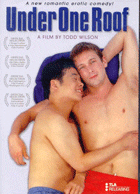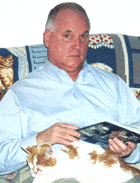 “Under
One Roof” “Under
One Roof”
Directed by Todd Wilson
Written by David Lewis
FMF (Fags Make Films)
TLA Releasing, 2002.
The words “cute” and “sweet” are old fashioned, but they perfectly
describe both the plot and the gay characters of this small gem of a
film. “Under One Roof” has often been compared to Ang Lee’s much
bigger-budgeted and more polished Hollywood feature film, “The Wedding
Banquet” (Twentieth Century Fox, 1993), most likely due to the fact
that both films feature inter-racial gay couples and explore the
apparent Chinese and Chinese-American cultural preoccupation of parents
arranging heterosexual marriages for their sons.
For many gay viewers, “The Wedding Banquet” features a
disappointing denouement that seems designed to satisfy straight or
mainstream audiences most likely in order to be commercially
successful. “Under One Roof” is unashamedly, undeniably, and
unapologetically GAY in its very loving ending for two exceptionally
likeable guys.
The story is simple. Daniel Chang, the chief protagonist in the story,
is a Chinese-American young man who lives in San Francisco. He is a
handsome gay man who attempts to live in two separate worlds. He dates
guys, he is out of the closet with his straight friends, and he
frequents gay venues on Castro Street.
Daniel’s second world is the traditional Chinese home he shares with
his mother and grandmother where he attempts to honor the cultural
custom of filial devotion to his mother. Mrs. Chang is either clueless
or remains in blind denial that her only son is gay. She parades before
him a procession of suitable Chinese young women to fulfill her one
goal in life that Daniel should choose a bride and begin producing
grandchildren.
(An intriguing cultural link in gay films is that the same
“males-cannot-leave-home-until-they-marry” rule is also at the heart of
the joyous “Mambo Italiano” with its Italian cultural traditions. It
seems that the Chinese are not alone in their matrimonial ambitions for
their sons.)
Daniel has been largely successful in keeping his mother’s matrimonial
attempts at bay. As he says, he has kept his “homo life” and his “home
life” separate, but things soon change. Enter Robert, the new
tenant in the Chang’s basement apartment. Robert is handsome, most
likely gay, and Daniel falls in love immediately. The feeling is mutual
as viewers learn when Robert’s mother arrives for a visit and
recognizes that her son has a crush on Daniel. (Robert has moved to San
Francisco from “Indiana No Pace” – read Indianapolis –expressly to live
OUT of the closet.) Suddenly, Daniel Chang’s two worlds have
collided and are about to implode. If Daniel can keep Robert in the
basement, he may be able to hold his own libido in check until he is
able to work out a more satisfactory arrangement, perhaps even finding
love under the same roof, but fate intervenes in the form of broken
plumbing in Robert’s apartment and he soon ends up in Daniel’s bed.
Love triumphs for a time as Robert and Daniel realize their mutual
caring and affection. Grandmother Chang delightfully approves of the
loving relationship of the guys, but a reckoning day arrives when Mrs.
Chang recognizes that Robert is not having the strong heterosexual
influence on her son that she had assumed. Plot-wise, Robert is
banished to L.A. and two hearts are broken. The third broken heart
belongs to Mrs. Change when her son angrily tells her that he is gay
and will never have a Chinese bride.
In her remorse and confusion, Mrs. Chang turns to Robert’s mother for
understanding. Robert’s mother asks her if it would not be better to
have two sons rather than just one or perhaps even none at all.
One of the important but understated themes of “Under One Roof”
is that generational differences are often more difficult for gay
people to overcome than racial, cultural, or even sexual diversity
prejudices. Mrs. Chang’s solitary goal that her son must marry a
Chinese woman is paramount to any other concern she evidences for his
happiness. She especially views Amy, the young Chinese woman next door,
as the perfect bride for her son. (Amy’s off-screen parents are equally
adamant that she should marry a Chinese man.) The parents appear to
have the most rigid prejudices. They also fail to realize that their
children determined years before to serve as cover for each other. Amy
is straight, but her boyfriend is Black. Daniel is gay. Amy and Daniel
serve as each other’s dates for Chinese community affairs in order to
satisfy the biases their parents hold. Robert and Daniel each have
devoted straight girl friends and most importantly, both Daniel and Amy
love others despite racial differences.
The final scene of “Under One Roof” is both fun and surprising. Daniel
is leisurely chatting with Amy when his indefatigable mother reaches
him via cell phone to inform him that she has once more been match
making and that the perfect date awaits him at home. Furious with her
non-stop meddling in his life, Daniel charges home ready to have a
final battle with his “dragon-lady” mother only to discover that the
date she has arranged for him is with Robert. As Daniel says, “Mom
finally got it right.” Gay love triumphs and reigns in the Chang
household. Two sons are better than one after all.
The lead actors are handsome and convincing in their roles. Jay Wong is
excellent as the confused Daniel Chang whose attempts to live in two
separate, unconnected worlds. The resultant lies cause him to be
delusional, unhappy, and to complain, “Their is one truth I cannot
avoid. I have no life at all.” James Marks portrays Robert as a
sensitive, charming, loving, and ultimately understanding lover. The
affection they share is especially appealing.
Three standout supporting characters are Mrs. Chang, convincingly
portrayed by Sandra Lee, and the adoring Gram Chang who is deliciously
depicted by Vivian Kobayashi, and never more so than when she
accidentally discovers Daniel’s XXX gay video collection. There is also
Daniel’s flamboyantly gay confidant Tony, wonderfully played by James
Quedado, whose idea of a long-term relationship is a three-day weekend
at a Russian River gay playground.
In addition to its substantial entertainment value, “Under One Roof”
contains a priceless trait and that is the comfortable presence of its
bi-racial love story. How much GLBT literature, on the printed page or
on the screen, features unselfconscious love between people of
different races? When “Under One Roof” does allude to the dissimilarity
between Daniel and Robert it is not because they are of different
races, but rather because they have been born into conflicting family
traditions. Although he is disconsolate to leave Daniel, Robert
confides to him his admiration for the filial devotion he demonstrates
for his mother. He unhappily admits that their differences represent a
condition that he is powerless to change, but its existence does not
lessen his love for either Daniel or his mother.
There is frontal nudity in “Under One Roof” that may offend some
viewers, but as with much of the rest of the film, the nudity is
natural and innocent and not lascivious or pornographic. To once again
borrow old-fashioned words, the nude love scenes of Daniel and Robert
are “cute” and “sweet” and they reveal the affection, commitment and
unselfish understanding of both men.
Much has been made in other reviews of “Under One Roof” of the
poor production values and the disparagement is justified. The camera
work is choppy and the sound is poor. The casting and writing are also
far from perfect. Robert’s mother is a case in point. It seems
improbable that she would be both physically taller and larger than her
fully grown adult son, and whereas her support for her gay son may
qualify her for the PFLAG Mother-of –the-Year award, there is virtually
no screen time devoted to explaining how she evolved into such an
accepting and loving parent. Indeed, in her awkwardly filmed first
scene, she is portrayed as being a meddler in her son’s life. It is
unfortunate that the technical aspects of the movie are so poor because
its overall amateurish appearance may prevent viewers from connecting
with both the touching love story as well as the especially honest
examination of cross-cultural gay relationships that are at the heart
of the film.
Look past the deficiencies of the production values of “Under One Roof
” and embrace the delightfulness of the love story that it tells and
hope that director Todd Wilson has earned the kind of budget he
deserves to produce top-notch gay films that are fashioned with
superior equipment, know-how, and expertise, but that never lose sight
of the kind of heart-warming celebration of gay love realized.
Jerry Flack, Denver, Colorado
|
Bio:
Jerry is a retired professor of
education from the University of Colorado. He lives in Denver, Colorado
with his partner of fourteen years, who is also a retired educator. He
loves reading, especially gay literature, and watching gay cinema
(current favorites are "ROAD TRIP" and "GONE, BUT NOT FORGOTTEN"), and
traveling throughout the glorious Southwest, especially in Santa Fe and
Taos, New Mexico, and the Colorado Rockies.

|
 Jerry Flack reviews the film...
Jerry Flack reviews the film...